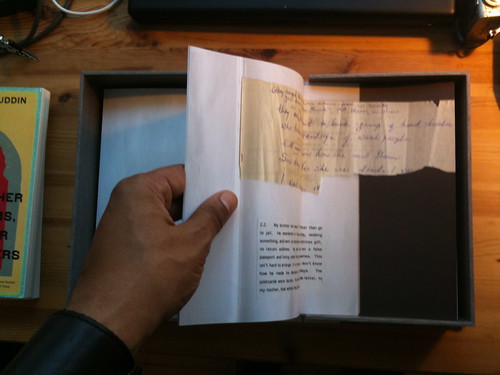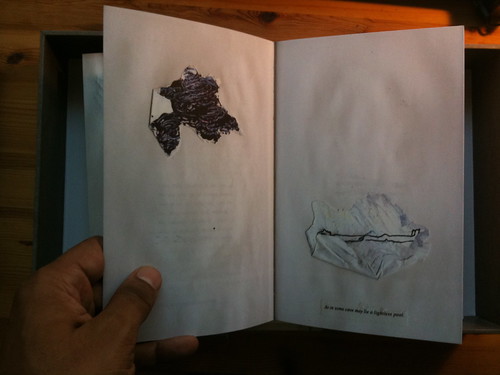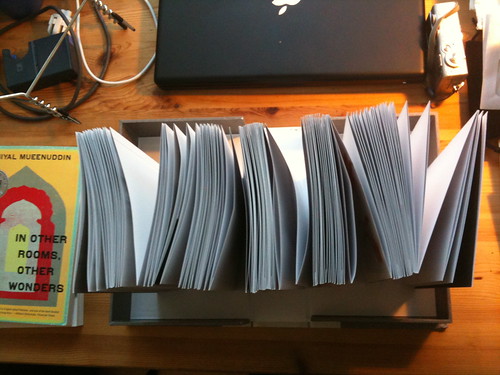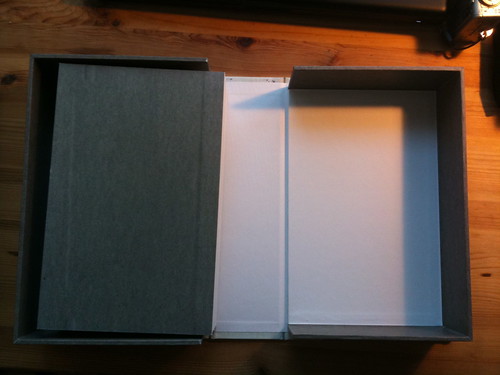In the current issue of the NYR, in "The Library: Three Jeremiads," Darnton returns to the arguments he has made before, but this time with a trio of "jeremiads," as he calls them, concerning three pressing economic and resource-related issues that American research libraries face which also negatively affect scholarly publishing; universities and college library collections, along with those of public libraries; library patrons, which is to say, readers; and, to a degree not yet fully understood, the humanities, intellectual life, and knowledge production themselves. The first two of Darnton's jeremiad's focus on the exorbitant cost and terms, verging on extortion, of subscriptions to scholarly journals, especially in the sciences, relative to other kinds of texts, which has forced libraries to cut their purchase of scholarly monographs, thus harming libraries' budgets and university presses' bottom lines. Over the longer haul, this economic problem, juxtaposed with constrained university and research library budgets, threatens the sustainability of the academic research enterprise as a whole. To give a sense of the astronomical prices charged by some publishers, information about which many professors are completely unaware and which have far exceeded the cost of inflation, the chemistry journal Tetrahedron costs $39,082 per year, while The Journal of Comparative Neurology costs $27,465 per year, and both, like many journals from a given publisher, must be purchased in bundles, with high kill fees to end subscriptions for specific journals and so forth. Humanities and social science journals total less per year but are still high and part of this system, with the result that the average cost in 2009 of a US journal title was $2,031 and $4,753 for a non-US title, and that year the journal publishing giant Elsevier made $1.1 billion in profits. Moreover, there is little transparency in this system, according to Darnton, giving the journal publishers an advantage over libraries, which, for the sake of the scholars they serve, cannot opt out.
Scholars and librarians have attempted to respond, with mixed reuslts. In the case of the Mellon Foundation-funded Gutenberg-e program, which sought to publish digital monographs of award-winning PhD dissertations in scholarly areas under greatest threat, the potential was great but it did not work out as planned, and the project is now defunct; in the case of digital, open-access scientific journals, there has been some success after scientists at University of California-Berkeley and Stanford circulated a petition in 2001 calling for colleagues to patronize only these journals. The publisher BioMed Central, according to Darnton, has shown since 1999 that this model can work. But the larger question of the effects on libraries and particularly on the humanities and social sciences remains. Darnton had been holding out hope for the Compact for Open-Access Publishing Equity (COPE), founded this year, would lead universities towards the open-access model in terms of publishing, and also subsidize authors who could not get grants or subvention money from their home institutions, with the texts ultimately available in both digital and print form via the Espresso Book Machine, about which I've written on here. But, and this is the core of his third jeremiad, there loometh Google.
A 368-page "settlement" between Google and the authors and publishers who sued the company (the publisher of my first book was party to this agreement, as Annotations, I gather, was scanned without permission) divided up the profits produced by Google Book Search in a 1/3 fashion: Google would 37 percent and the authors and publishers would get 2/3rds. Fine. But, as a result of this, Google has proposed that libraries, some of which (like Harvard's) provided books for scanning free of charge, now pay a subscription fee to access Google's vast digital storehouse, which is now the largest digital library (and as recent announcements have shown, potentially the largest digital book retailer). Darnton's fear, quite reasonable given the history of such things, is that "cocaine pricing" will occur, which is to say, Google will start out with low subscription fees and then jack them up to unspeakable--unaffordable rates--once it has libraries and everyone else in its clutches.
Of course most people are completely unaware of all of this, both in terms of what's going on now and what could occur in the future. As he has in the past, Darnton is proposing a counterweight to Google, which is a National Digital Library, which would draw primarily upon the extraordinary collection of books, particularly those no longer under copyright or still in copyright but out of print, whose authors cannot be located, and so forth, belonging to the Library of Congress, but also from other vast library systems, like Harvard's. Darnton points out that in December 2009, French President Nicolas Sarkozy announced that he would set aside €750 million (roughly $900 million dollars, correct?) to digitize France's "cultural 'patrimony,'" and notes that the national libraries of the Netherlands, Japan, Australia, Norway, and Finland are digitizing their complete collections, and that European nations in collective fashion will have digitized over 10 million texts, from libraries, archives, museums, and audiovisual stocks, by the end of 2010. Darnton believes that Google has shown that for less than the cost Sarkozy appropriated, it is possible to digitize the Library of Congress's complete holdings, a good deal of which are already converted, but that Google itself might be persuaded to share--for free, with a great deal of praise--the 2 million or so materials in the public domain it digitized. Even if Google does not participate, Darnton believes private foundations might be able to underwrite this project, especially if its costs were spread out over time, but he does not believe that a Digital Library of America would solve or resolve the interrelated and waxing crises research libraries, the scholarly profession, and journal publication face. Rather, this vast digital storehouse, freely available to all, might change the "ecology" (back?) toward the idea of the public good, or public common, but even if it didn't do so completely, it would be an important start.
===
Speaking of books and reading, I just noticed the other day that Kamau Brathwaite has published a new book of poems, Elegguas (Wesleyan University Press/UPNE, 2010). Wesleyan's site says of the book
Kamau is, as it also notes, one of the major poets of the 2nd half of the 20th century, and one of the leading lights in Caribbean, African Diasporic and Anglophone poetry, and I would add without hesitation one of the most important experimental and political poets alive today. This fall has brought a marvelous harvest of new books by marvelous poets, and this appears as if it surely is among this bounty.
Elegguas—a play on “elegy” and “Eleggua,” the Yoruba deity of the threshold, doorway, and crossroad—is a collection of poems for the departed. Modernist and post-modernist in inspiration, Elegguas draws together traditions of speaking with the dead, from Rilke’s Duino Elegies to the Jamaican kumina practice of bringing down spirits of the dead to briefly inhabit the bodies of the faithful, so that the ancestors may provide spiritual assistance and advice to those here on earth. The book is also profoundly political, including elegies for assassinated revolutionaries like in the masterful “Poem for Walter Rodney.”
Throughout his poetry, Brathwaite foregrounds “nation-language,” that difference in syntax, in rhythm, and timbre that is most closely allied to the African experience in the Caribbean, using the computer to explore the graphic rendition of nuances of language. Brathwaite experiments using his own Sycorax fonts, as well as deliberate misspellings (“calibanisms”) and deviations in punctuation. But this is never simple surface aesthetic, rather an expression of the turbulence (in history, in dream) depicted in the poems. This collection is a stunning follow-up to Brathwaite’s Born to Slow Horses (Wesleyan, 2005), winner of the Griffin International Poetry Prize.
===
Speaking of more books and reading, the National Book Foundation is sponsoring an Innovations in Reading Prize. For whom and what is this?
| ||
|





 Each year, the National Book Foundation awards a number of prizes of up to $2,500 each to individuals and institutions--or partnerships between the two--that have developed innovative means of creating and sustaining a lifelong love of reading. In addition to promoting the best of American literature through the National Book Awards, the Foundation also seeks to expand the audience for literature in America. Through the Innovations in Reading Prizes, those individuals and institutions that use particularly innovative methods to generate excitement and a passionate engagement with books and literature will be rewarded for their creativity and leadership.
Each year, the National Book Foundation awards a number of prizes of up to $2,500 each to individuals and institutions--or partnerships between the two--that have developed innovative means of creating and sustaining a lifelong love of reading. In addition to promoting the best of American literature through the National Book Awards, the Foundation also seeks to expand the audience for literature in America. Through the Innovations in Reading Prizes, those individuals and institutions that use particularly innovative methods to generate excitement and a passionate engagement with books and literature will be rewarded for their creativity and leadership.









